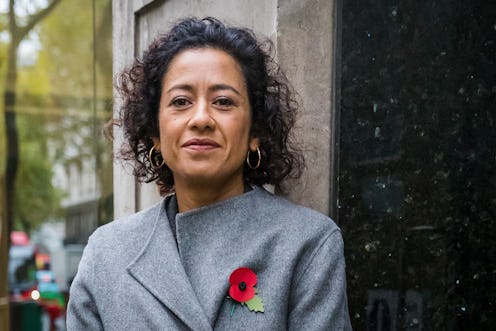News
Over 120 Women At The BBC Complained About Equal Pay, A New Document States

According to a newly-released document, more than 100 women have complained to the BBC about equal pay. Forming part of the supporting evidence in presenter Samira Ahmed's equal pay case, per the Telegraph, the list openly states the names of 121 female employees who signed a letter in 2017 aiming to address pay inequality.
Ahmed's representation, Thompsons Solicitors, have asked media outlets not to identify the individuals, reports the Guardian, to avoid "a breach of privacy." Some have published them anyway. (The BBC said it is not responsible for the unredacted list. The National Union of Journalists, which issued the letter, said names "should have been redacted.")
The number of women unhappy with the BBC's pay scale only serves to escalate Ahmed's case against the corporation. Ahmed wants almost £700,000 in BBC back pay, per the Guardian, after finding out she was paid £440 per episode for presenting Newswatch compared to Jeremy Vine's £3,000 per episode pay for Points of View. Her tribunal began on Monday, Oct. 28, and is expected to last until Nov. 5.
Ahmed, who previously received backdated pay for radio work, per the Times, is arguing that both programmes are of similar length with a similar format and that she did more scriptwriting work than Vine. Her team have also stated that viewing figures for Newswatch more than double those of Points of View.
“It seems to me that men are more likely to be seen as stars, or at least stars that should be paid very highly," she told the tribunal. "I don’t think it is clear what criteria the BBC use to decide whether someone is a star.” According to the presenter, a senior manager told her: “The BBC doesn’t do equal pay.”
Equal pay — that is, when women and men are paid the same amount for the same work — has been enshrined in British law since 1970. The BBC denies breaking this law, saying Ahmed's and Vine's roles were not equal. Part of its response has been described as "unusual" by the Guardian. Not only has the BBC labelled Points of View as an entertainment show helmed by high-profile presenters and Newswatch as a "serious programme" led by a journalist, it has called its news channel a "relatively niche" one.
Ahmed's "star" comments came in conjunction with further evidence that revealed how the BBC conducts talent reports on certain presenters. As Deadline states, a 2017 report on Vine showed he was recognised by almost 80% of people questioned. It also included graphs detailing the presenter's likability, among other attributes.
Ahmed's is the first major case to take place since 2017, when the BBC's highest-earning presenters list showed a distinct lack of women. But it is not expected to be the last. Per the Telegraph, more women could be preparing to launch similar tribunal cases.
“I’m aware of about a dozen cases that are in the pipeline towards a tribunal now," said Carrie Gracie, the former BBC China editor who resigned in January 2018 over equal pay. (In June that year, the BBC awarded her back pay, and she donated the entire sum to the Fawcett Society.)
In May, another ex-BBC employee received a settlement of more than £130,000, notes the Guardian. Caroline Barlow filed a claim that 15 men working in identical roles in her division were being paid more. The BBC denied allegations but settled out of court.
An investigation has been launched into the BBC's suspected pay discrimination. The Equality and Human Rights Commission will publish its findings and recommendations in the coming months.